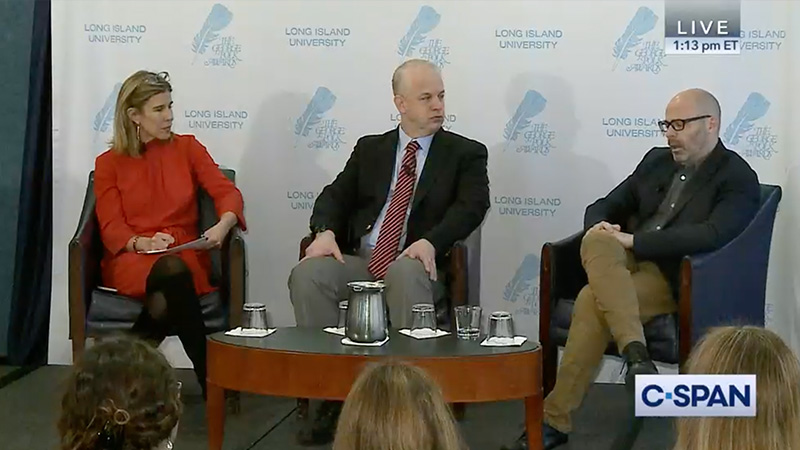Watch C-Span Coverage
Coverage of Chinese Repression, Boeing Failures, Taxi Scandal Among the Winners
WASHINGTON, DC (Feb. 19, 2020) – Long Island University (LIU) has announced the winners of the 71st annual George Polk Awards in Journalism, honoring 15 winners in 14 categories for their reporting in 2019. Their work sheds light on a range of deceit and corruption — with profound and sometimes deadly consequences — in world capitals across four continents as well as federal agencies, corporate offices and local governments in the United States.
Among the award winners announced today in the First Amendment Lounge at the National Press Club in Washington, D.C. were reporters who exposed the massive extent of Chinese repression of its Muslim minority, used advanced visualization techniques to establish that Russian pilots bombed Syrian hospitals, and defied acute danger to provide harrowing accounts of Central American gang violence.
Other winners revealed how Boeing and the FAA cut corners to speed a new plane into the air with systemic flaws that caused two horrific crashes, predatory lenders heaped insurmountable debt on unsuspecting taxi drivers leading to at least nine suicides, wealthy developers reaped windfall savings from a law ostensibly enacted to aid depressed areas, and the Department of Agriculture buried its own research into ways farmers can adapt to climate change.
George Polk Awards also went to journalists for reporting that led to the ousting of mayors accused of misconduct in Baltimore and Wichita, forced the closure of a Pennsylvania reform school for gross abuse of children in its care, showed how the Trump Administration used dubious claims to justify the continued separation of immigrant children from their parents, and unearthed a trove of documents disclosing how U.S. officials misled the public for nearly two decades about the war in Afghanistan.
Three awards focused on racism past and present — a New York Times supplement examining the central role of slavery in American history and its continuing legacy in present-day society, an investigative report on widespread suburban housing discrimination on Long Island, and an eye-opening account of the massive seizure of black-owned land in the South under “heirs’ property” laws.
“In an age when much of our most incisive journalism is the product of multi-organization collaboration and team reporting, it is heartening to note that eight of this year’s Polk winners are the work of individual reporters,” said John Darnton, curator of the awards. “This speaks to the legacy of the man whose work these awards continue to honor 72 years after his assassination.”
The George Polk Awards are conferred annually to honor special achievement in journalism. The awards place a premium on investigative and enterprising reporting that gains attention and achieves results. They were established in 1949 by LIU to commemorate George Polk, a CBS correspondent murdered in 1948 while covering the Greek civil war.
Below are the winners of the 2019 George Polk Awards, chosen from among 551 entries nominated by news organizations and individuals or recommended by a national panel of advisors:
Azam Ahmed of The New York Times, receives the award for Foreign Reporting for risking his safety time and again to portray the reality and impact of violence perpetrated by gangs, drug cartels and even police in firsthand dispatches from Brazil, Jamaica, Honduras, Guatemala and Mexico, where he is stationed as the Times Bureau Chief.
The award for National Reporting goes to Lomi Kriel of the Houston Chronicle for revealing previously unreported aspects of the Trump Administration’s immigration policy and tactics that extracted a heavy and sometimes lethal toll on Latin American refugees, including the continued separation of some families without apparent reason.
The staff of Newsday receives the award for Metropolitan Reporting for “Long Island Divided,” a series three years in the making that exposed an endemic pattern of discrimination by suburban realtors steering homebuyers of color away from white enclaves in violation of federal and state law. It drew promises of action from officials at every level of government.
The award for Local Reporting goes to Brian M. Rosenthal of The New York Times for unearthing a pernicious scheme by unscrupulous lenders to drive up the price of taxi medallions and turn huge profits by selling them to unsophisticated cab drivers with loans they could never repay, leading borrowers into financial ruin so devastating at least nine committed suicide.
Mark Scheffler, Malachy Browne and the Visual Investigations Team of The New York Times are honored for International Reporting for using local plane spottings, satellite imagery, cockpit recordings and Google Earth tools to map and geolocate the attacks to establish that Russian pilots in Syria bombed four hospitals, a busy commercial street and a refugee camp, killing scores of civilians. It was one of a number of wide-ranging coups the team pulled off combining advanced technology with ground level reporting in Venezuela, Afghanistan, Libya, North Korea and Hong Kong.
The award for Financial Reporting goes to Noah Buhayer, Caleb Melby and David Kocieniewski of Bloomberg News for groundbreaking stories on how wealthy, well-connected individuals perverted the stated intention of “opportunity zone” incentives in the 2017 federal tax code for their own profit. The program was aimed at spurring economic growth in depressed areas, but some developers reaped tax breaks by using it for such high-end projects as a long-planned $4 billion luxury North Miami development and the construction of a Ritz-Carlton hotel in downtown Portland, Oregon.
Dominic Gates, Mike Baker, Steve Militech and Lewis Kamb of The Seattle Times are honored in the Business Reporting category for first exposing the cooperative arrangements between Boeing and the Federal Aviation Administration that led to approval of design changes in 737 Max jets blamed for two crashes, killing 346. Times reporters traced FAA approval of the flawed flight control system to its decision to defer to Boeing’s own safety analysis, which they attributed to pressure from leaders of the company and the agency to speed production and avoid adding costs.
Helena Bottemiller Evich of Politico wins the award for Environmental Reporting for describing how a politicized Department of Agriculture ignored its own climate action plan, devoted a miniscule portion of its budget to climate change, which it acknowledges is the gravest threat to food production, and buried a study warning of lost nutrients in rice, the leading source of nutrition for 600 million people, provoking a highly regarded scientist to quit in disgust.
The award for Military Reporting goes to Craig Whitlock of The Washington Post for forcing the release of interviews conducted about the Afghan War as part of a five-year, $11 million federal “Lessons Learned“ project. After Whitlock received more than 2,000 documents, including some initially withheld, he puzzled out key redactions before producing “The Afghanistan Papers,” which demonstrated that “senior U.S. officials failed to tell the truth about the war in Afghanistan throughout the 18-year campaign, making rosy pronouncements they knew to be false and hiding unmistakable evidence the war had become unwinnable.”
Lisa Gartner of The Philadelphia Inquirer receives the Justice Reporting award for “Beaten, Not Silenced,” which exposed a pattern of violent physical abuse of boys housed at the Glen Mills Schools, a 193-year-old reformatory in suburban Delaware County. Gartner’s reporting was so devastating that within days state officials ordered Glen Mills closed and pledged to do a better job of monitoring conditions at juvenile justice facilities across Pennsylvania.
The award for Political Reporting is shared by Chance Swaim, Jonathan Shorman and Dion Lefler of The Wichita Eagle and Luke Broadwater and the staff of The Baltimore Sun for turning journalistic intuition into deep dives into public records that revealed municipal misconduct leading to the ouster of mayors in both cities.
Eagle reporters determined that Mayor Jeff Longwell steered a $524 million contract for a desperately needed water treatment plant to friends and supporters, rejecting the unanimous choice of a selection panel. Longwell lost his reelection bid after a campaign that turned on the Eagle’s investigation of an ad falsely connecting his opponent to sexual harassment allegations.
An offhand remark set Broadwater and his Sun colleagues off on an investigation that determined Baltimore Mayor Catherine Pugh had gleaned $800,000 in payoffs disguised as bulk purchases of her “Healthy Holly” children’s book by a hospital network and health insurers. As a result, Pugh resigned and pleaded guilty to federal charges, the network’s board and CEO departed, and the state and city toughened ethics laws.
Lizzie Presser of ProPublica and The New Yorker wins the award for Magazine Reporting for “The Dispossessed,” an account of how speculators use legal loopholes associated with “heirs’ property” laws in the South to seize black-owned ancestral lands, uprooting lifelong residents who assume their homes and property have been passed down to them. Especially poignant was Presser’s portrait of two brothers in a North Carolina coastal town jailed for nearly eight years for refusing to leave.
The award for Television Reporting goes to John Sudworth of BBC News for “Inside China’s Hidden Camps,” which documented the reality of camps authorities established in Xinjiang province to indoctrinate hundreds of thousands of Muslims in an effort to erase their religion and culture. Allowed by authorities to visit one camp depicted as a model of agreeability, Sudworth used satellite photos, leaked documents and interviews with forlorn parents seprated from their children to paint a very different picture.
A Special Award is presented to Nikole Hannah-Jones of The New York Times and contributors to “The 1619 Project,” a supplement published on the 400th anniversary of the advent of American slavery, using essays by journalists and scholars to explore the role of slavery in history and its enduring effects in contemporary American society. A powerful introduction by Hannah-Jones, the project’s creator and driving force, examined efforts of black Americans to advance the nation’s expressed ideals of democracy, liberty and equality in the face of centuries of oppression and exclusion.
Winners of the 2019 awards will be honored at a luncheon ceremony at the Roosevelt Hotel in Manhattan on Friday, April 3. The journalist and author Charlayne Hunter-Gault will read the award citations and will also moderate this year’s David J. Steinberg Seminar of the George Polk Awards, on Thursday evening, April 2, at LIU Brooklyn’s Kumble Theater for the Performing Arts. Several of this year’s award winners are expected to take part in the seminar, which starts at 6:30 p.m. and is free and open to the public.
Media contacts:
John Darnton, Polk Awards Curator, 917-306-8046, John.Darnton@gmail.com
Ralph Engelman, Polk Awards Faculty Coordinator, 718-757-9294, Ralph.Engelman@liu.edu
About Long Island University (LIU)
LIU, founded in 1926, continues to redefine higher education, providing high quality academic instruction by world-class faculty. Recognized by Forbes for its emphasis on experiential learning and by the Brookings Institution for its “value added” to student outcomes, LIU offers more than 320 academic programs, with a network of over 265,000 alumni including industry leaders and entrepreneurs across the globe. Innovation in engaged learning, and strong career outcomes distinguish LIU as a leader among the nation’s most respected universities. Visit liu.edu for more information.





